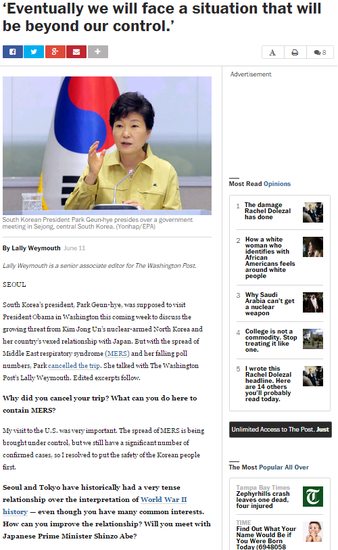hankyoreh
Links to other country sites 다른 나라 사이트 링크
[Editorial] On comfort women issue, principle must come before politics

President Park Geun-hye recently made the bombshell announcement that there has been “considerable progress” on the issue of the comfort women - sex slaves for the Japanese imperial army that remain one of the biggest issues affecting South Korea’s relations with Japan - and that negotiations are in the “final stage.”
There is no way to know whether Park’s comments actually reflect the results of deliberations between bureau chief-level officials designed to resolve the issue of the comfort women - now in their eighth round - or whether they are supposed to put pressure on the Japanese government, which has been reluctant to tackle the issue.
Regardless, Park‘s comments deserve attention since they were made shortly before June 22, the 50th anniversary of the two countries normalizing diplomatic relations, at a time when the US has been putting pressure on its two allies to resolve their differences.
Park made the comments in an interview with the Washington Post on June 11, adding that “because these are behind-the-scenes discussions, I would be remiss to disclose the elements of the discussions.” But judging from the responses of South Korean and Japanese diplomats and the Korean Council for the Women Drafted for Military Sexual Slavery by Japan, there is a significant gap between President Park’s comments and the situation that is unfolding on the ground.
Since the Kyoto summit in Dec. 2011 between former South Korean president Lee Myung-bak (in office 2008-2013) and then Japanese prime minister Yoshihiko Noda (2011-2012) ground to a halt because of the comfort women issue, the closest thing to a solution that Japan has proposed to South Korea was the so-called Sasae proposal, which Japanese Vice Foreign Minister Kenichiro Sasae brought to the table in Mar. 2012.
The main points of the proposal were for the Japanese Prime Minister to send letters of apology to the surviving comfort women that would be personally delivered by the Japanese Embassy in South Korea and for the Japanese government to set up a fund to provide humanitarian measures. But the South Korean government rejected the proposal on the grounds that the Japanese government did not accept responsibility.
After the Democratic Party of Japan (DPJ) subsequently handed over power to the more conservative Liberal Democratic Party (LDP), with Prime Minister Shinzo Abe at the helm, the Japanese government is apparently no longer even willing to offer the concessions outlined in the Sasae proposal. Furthermore, Japanese representatives in the bilateral bureau chief-level negotiations are reportedly asking South Korea to remove the young woman statue that is in front of the Japanese Embassy in Seoul and to stop bringing up the issue up in the international community as preconditions for resolving the comfort women issue.
With the recent deaths of two of the oldest comfort women, the number of survivors registered with the South Korean government has decreased to 50. For this reason, there is admittedly growing humanitarian pressure to find a solution to the issue of the comfort women while the women are still alive.
But that must not serve as an excuse to pursue a compromise of expediency with Japan on the issue of the comfort women. The greatest point of controversy in regard to the issue of the comfort women is not money but rather whether Japan will admit its responsibility.
The South Korean government must realize that pursuing a political compromise at the expense of this principle is tantamount to putting the cart before the horse.
Please direct questions or comments to [english@hani.co.kr]

Editorial・opinion
![[Guest essay] The real reason Korea’s new right wants to dub Rhee a founding father [Guest essay] The real reason Korea’s new right wants to dub Rhee a founding father](https://flexible.img.hani.co.kr/flexible/normal/500/300/imgdb/original/2024/0423/8317138574257878.jpg) [Guest essay] The real reason Korea’s new right wants to dub Rhee a founding father
[Guest essay] The real reason Korea’s new right wants to dub Rhee a founding father![[Column] ‘Choson’: Is it time we start referring to N. Korea in its own terms? [Column] ‘Choson’: Is it time we start referring to N. Korea in its own terms?](https://flexible.img.hani.co.kr/flexible/normal/500/300/imgdb/original/2024/0423/3617138579390322.jpg) [Column] ‘Choson’: Is it time we start referring to N. Korea in its own terms?
[Column] ‘Choson’: Is it time we start referring to N. Korea in its own terms?- [Editorial] Japan’s rewriting of history with Korea has gone too far
- [Column] The president’s questionable capacity for dialogue
- [Column] Are chaebol firms just pizza pies for families to divvy up as they please?
- [Column] Has Korea, too, crossed the Rubicon on China?
- [Correspondent’s column] In Japan’s alliance with US, echoes of its past alliances with UK
- [Editorial] Does Yoon think the Korean public is wrong?
- [Editorial] As it bolsters its alliance with US, Japan must be accountable for past
- [Guest essay] Amending the Constitution is Yoon’s key to leaving office in public’s good graces
Most viewed articles
- 1[Column] ‘Choson’: Is it time we start referring to N. Korea in its own terms?
- 2[Guest essay] The real reason Korea’s new right wants to dub Rhee a founding father
- 3New AI-based translation tools make their way into everyday life in Korea
- 4Opposition calls Yoon’s chief of staff appointment a ‘slap in the face’
- 5Senior doctors cut hours, prepare to resign as government refuses to scrap medical reform plan
- 6Why Korea shouldn’t welcome Japan’s newly beefed up defense cooperation with US
- 7[Editorial] Japan’s rewriting of history with Korea has gone too far
- 8Terry Anderson, AP reporter who informed world of massacre in Gwangju, dies at 76
- 9[Column] Has Korea, too, crossed the Rubicon on China?
- 10[Column] The clock is ticking for Korea’s first lady